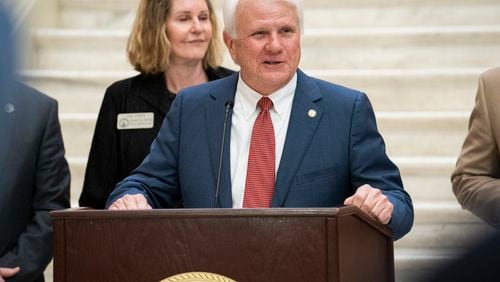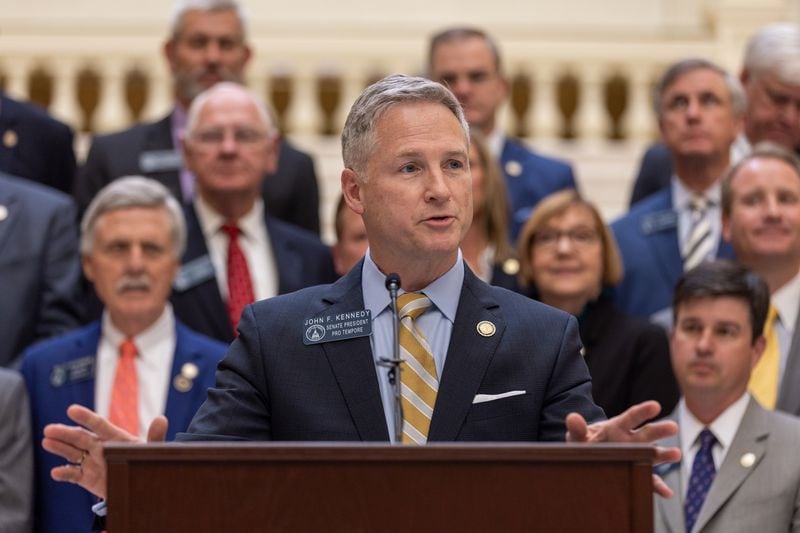Proposals focus on state income tax rate, child deductions, homestead exemption
Republicans will pursue several measures during the legislative session that they say could amount to hundreds of millions of dollars in savings to taxpayers.
“Taken together, these bills will provide significant relief to taxpayers across the state, put more money back into their pockets and continue to boost our economy,” Georgia House Speaker Jon Burns said at a Capitol press conference.
The proposals would:
- Accelerate implementation of a 2022 law to gradually cut the state’s income tax rate.
- Boost the state’s annual income tax deduction for children by $1,000, bringing it to $4,000 a year.
- Double the standard state homestead exemption on property from $2,000 to $4,000 a year.
Gov. Brian Kemp and legislative leaders first announced last month that they wanted to speed up cuts to the state’s income tax rate under a law — passed as House Bill 1437 — gradually reducing it from 5.75% to 4.99% by 2029.
The rate dropped to 5.49% on Jan. 1, but Kemp, Burns and legislative leaders want trim it to 5.39% this year.
Kemp said that change alone would save Georgians about $300 million annually in taxes.
House staffers said the increases to the child deduction and the state homestead exemption would save Georgians about $250 million a year.
The state’s $16 billion in “rainy day” and undesignated reserves, built on three straight years of large surpluses, help make the tax measures possible.
Some Democrats, however, say the giant surpluses are a product of Kemp underfunding key areas such as public health care, while building up reserves that he can later help dole out on politically popular spending in an election year, such as tax breaks.
Credit: arvin.temkar@ajc.com
Credit: arvin.temkar@ajc.com
Bill to make antisemitism a hate crime gains final passage
After stalling last year in the state Senate, a bill gained final approval from the General Assembly to make antisemitism a part of Georgia’s hate crimes law.
Senators voted 44-6 this past week in favor of House Bill 30. The House followed shortly afterward to OK the measure on a vote of 129-5.
“It is time: Let the voice of Georgia be heard that antisemitism is condemned and rejected,” said state Senate President Pro Tem John Kennedy, a Republican from Macon.
The legislation hinges on a definition of antisemitism by the International Holocaust Remembrance Alliance that drew objections from opponents of HB 30 because it includes examples of when speech against Israel amounts to attacks against Jewish people, such as claiming that the existence of Israel is a racist endeavor.
“This bill has been dubbed the antisemitism bill, but in reality it’s the anti-speech bill,” said state Sen. Nikki Merritt, a Democrat from Grayson who voted against the measure. “It does nothing to protect Georgians from antisemitism. It instead imposes sanctions on those who speak out about the actions of the Israeli government.”
The legislation would add antisemitism to the state’s existing hate crimes law, which allows harsher criminal penalties against those who target victims on the basis of race, gender, sexual orientation, sex, national origin, religion, or physical or mental disability. The measure could also apply to discrimination cases in colleges and government agencies.
After the legislation fell short last year, Republican leaders emphasized its passage this year. Democrats were more divided on the measure, but most of them voted in favor of it.
Credit: Katelyn Myrick/AJC
Credit: Katelyn Myrick/AJC
Senate panel backs legislation to allow investigation of secretary of state
Senate Republicans voted to allow the State Election Board to investigate Secretary of State Brad Raffensperger.
Senate Bill 358 also would remove Raffensperger as a nonvoting member of the election board. That comes after lawmakers voted in 2021 to remove Raffensperger, the state’s top voting official, as chairman of the board that oversees elections in Georgia.
Raffensperger called SB 358 a “complete and total lapse of judgment.” His general counsel, Charlene McGowan, went further, saying in a letter that it would violate the Georgia Constitution by giving “unelected bureaucrats unchecked power over the state’s executive branch” and could lead to illegal election interference.
“This authority could easily be weaponized by political activists seeking to use the State Election Board to punish political opponents or prevent the lawful certification of election results, harming the integrity of Georgia’s elections,” McGowan wrote in the letter to the bill’s sponsor, Sen. Max Burns, R-Sylvania.
Burns, a former college president who is not a lawyer, disputed McGowan’s assertion that his bill is unconstitutional, and he said it wasn’t intended to interfere in elections.
“We’re trying to provide reasonable oversight of a process that affects every citizen of Georgia,” Burns said.
Raffensperger has drawn fire from some Republicans after he defended the integrity of the results of the 2020 presidential election against then-President Donald Trump’s false claims that the vote had been rigged to deny him reelection.
The State Election Board recently declined to investigate Raffensperger for his handling of the 2020 election. But it voted unanimously to ask the General Assembly to clarify whether it had the authority to do so.
Panel weighs in against ranked-choice voting
Ranked-choice voting didn’t have the votes in the state Senate.
The chamber backed Senate Bill 355, which would prohibit the use of ranked-choice voting statewide — except as allowed by federal law for military and overseas voters.
Under ranked-choice voting, voters would fill out their ballots by choosing their second-choice candidate along with their top pick. Then, if a voter’s first choice doesn’t finish among the top two candidates, the vote for the second-choice candidate would be counted, avoiding the need for another election.
Supporters say ranked-choice voting eliminates expensive runoff elections and increases voter participation. Critics say it’s a confusing system that has allowed candidates with low initial vote totals to ultimately prevail.
Credit: Natrice Miller/AJC
Credit: Natrice Miller/AJC
Top Republicans make push for school vouchers
School vouchers were the topic of choice when top Georgia Republicans spoke at a Faith and Freedom Coalition luncheon.
“I know we’re going to get school choice done this year,” Lt. Gov. Burt Jones told the crowd of Christian conservatives.
Jones connected his position on vouchers to his stance opposing abortion, saying that “if you’re going to be pro-life, you’ve got to be pro-life at every stage.”
Gov. Brian Kemp also weighed in, saying the General Assembly needs to “get a bill passed and signed into law this session” to give families “more freedom and choice when it comes to child education.”
Vouchers face some obstacles, though.
Last year, 16 House Republicans voted with Democrats to block passage of Senate Bill 233, which would use taxpayer dollars to finance a $6,500-per-student voucher to pay for private school tuition or home-school expenses. It’s the second year of a legislative term, though, so SB 233′s backers could still push it through the General Assembly in coming weeks.
There’s also a matter of public opinion.
An Atlanta Journal-Constitution poll of registered voters found earlier this month that about 60% of respondents — including 50% of those who identified themselves as conservatives — oppose vouchers.
Advocates for vouchers see them as a way to give students an opportunity to get a quality education, especially if their public school district is failing.
Critics, however, say vouchers could pull public resources away from those school districts in need. They add that in the case of SB 233, $6,500 is not enough to cover a student’s tuition in most private schools, so low-income families would not benefit.
Credit: Arvin Temkar/AJC
Credit: Arvin Temkar/AJC
Senate sets up special committee to investigate Willis
The Republican-led state Senate voted to set up a special panel to investigate Fulton County District Attorney Fani Willis after she brought an indictment on charges of election interference against former President Donald Trump.
The Senate Special Committee on Investigations, which does not require House approval, will have the ability to subpoena people and evidence. The measure, which passed on a 30-19 party-line vote, also calls for requiring that testimony be given under oath, a power no other legislative committee holds. That power will likely be challenged in court.
If the committee finds there has been misconduct, it can recommend changes to state law or the budget.
Sen. Greg Dolezal, R-Cumming, proposed establishing the committee, citing accusations that Willis is in an “improper” relationship with Nathan Wade, who she hired to help lead the investigation into efforts by Trump and 18 co-defendants to overturn the results of the 2020 presidential election. The accusations against Wills stem from divorce filings by Wade’s estranged wife.
Republican senators have also created a separate panel to investigate problems at the Fulton County Jail, including overcrowding, a backlog of cases and dangerous conditions.
They said the subcommittee had nothing to do with politics or Willis. The district attorney, however, has faced accusations that she focused too much attention on the Trump investigation instead of moving criminal cases through initial hearings that could ease crowded conditions at the jail.
Measure advances that would change law involving oversight of prosecutors
A state House panel backed alterations to a law passed last year to create a commission to oversee prosecutors after the state Supreme Court found fault with one of its provisions.
The Prosecuting Attorneys Qualifications Commission would have the power to sanction and even oust those it finds have neglected their duties or committed other violations.
But the high court said it had “grave doubts” about whether it had the constitutional authority to approve rules for the commission, one of the steps the law had required before it could begin examining complaints filed against prosecutors.
The House Judiciary Non-Civil Committee passed legislation to remove that directive in hopes it will allow the commission to pursue its work.
The commission is considered part of a GOP-led drive nationwide to exert more control over liberal prosecutors that Republicans accuse of neglecting their duties because they refuse to enforce low-level drug offenses, anti-abortion restrictions and tough-on-crime crackdowns.
Some critics of the law that created the commission, Senate Bill 92, view it as a way to punish Fulton County District Attorney Fani Willis for seeking election interference charges against former President Donald Trump as part of his efforts to reverse his defeat in the 2020 presidential election.
During debate last year, though, supporters of SB 92, including Gov. Brian Kemp, avoided overt mention of Willis. Instead, they said the proposal was designed to pursue “rogue prosecutors” who were ignoring their duties or flouting the law.
Bipartisan support builds in favor of sports betting
The odds may now be in favor for legalizing sports betting in Georgia.
The Georgia Lottery Corp. would oversee the betting under Senate Bill 386, a measure introduced by Republican state Sen. Clint Dixon of Gwinnett County, and proceeds would boost the HOPE college scholarship, prekindergarten programs and needs-based student aid.
Supporters have estimated that sports betting would bring $30 million to $100 million in taxes or fees to the state each year, although opponents say those numbers are inflated.
Backers of the measure include some of the Senate’s high rollers, such as Minority Leader Gloria Butler, a Democrat from Stone Mountain, and Republican state Sen. Bo Hatchett of Cornelia, one of Gov. Brian Kemp’s floor leaders. Lt. Gov. Burt Jones also appears to be a fan of the bill.
Placing the Georgia Lottery in charge of oversight is one of the keys to the legislation’s passage.
Some say expanding gambling in Georgia would require a constitutional amendment. Chances of that are iffy because two-thirds of each chamber of the General Assembly would have to vote in favor of the measure before it would be placed before voters in a statewide referendum. An effort last year in the Senate fell eight votes short of the two-thirds threshold.
Others say a constitutional amendment isn’t needed. Sports betting, they say, should be considered a lottery game — to be managed by the Georgia Lottery — so it would take only a simple majority in each chamber of the General Assembly, plus Kemp’s signature, to become law.
Capitol Recap: The 2024 Legislative Session
Want to know what legislators did this past week and how it might affect you? Check out our weekly newsletter, Capitol Recap: The 2024 Legislative Session, every Friday.
To subscribe, go to https://www.ajc.com/subscribe-2024-legislative-session/.
About the Author












